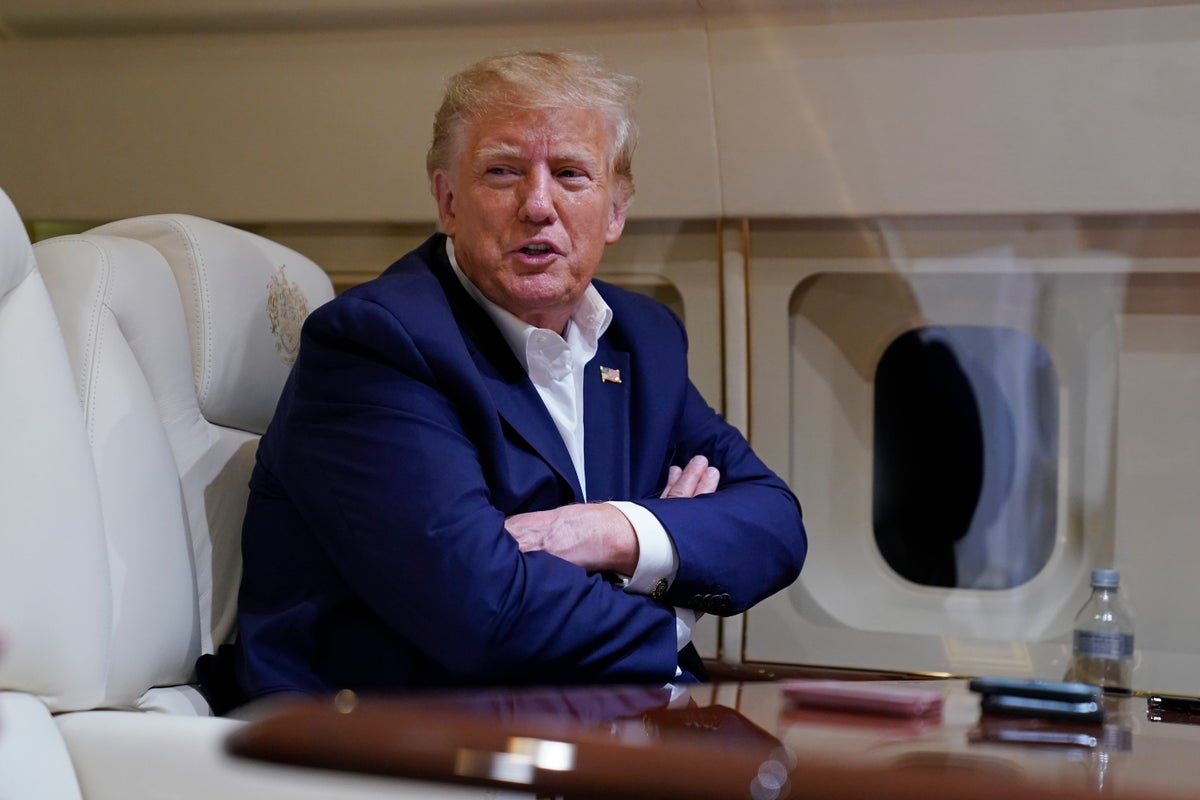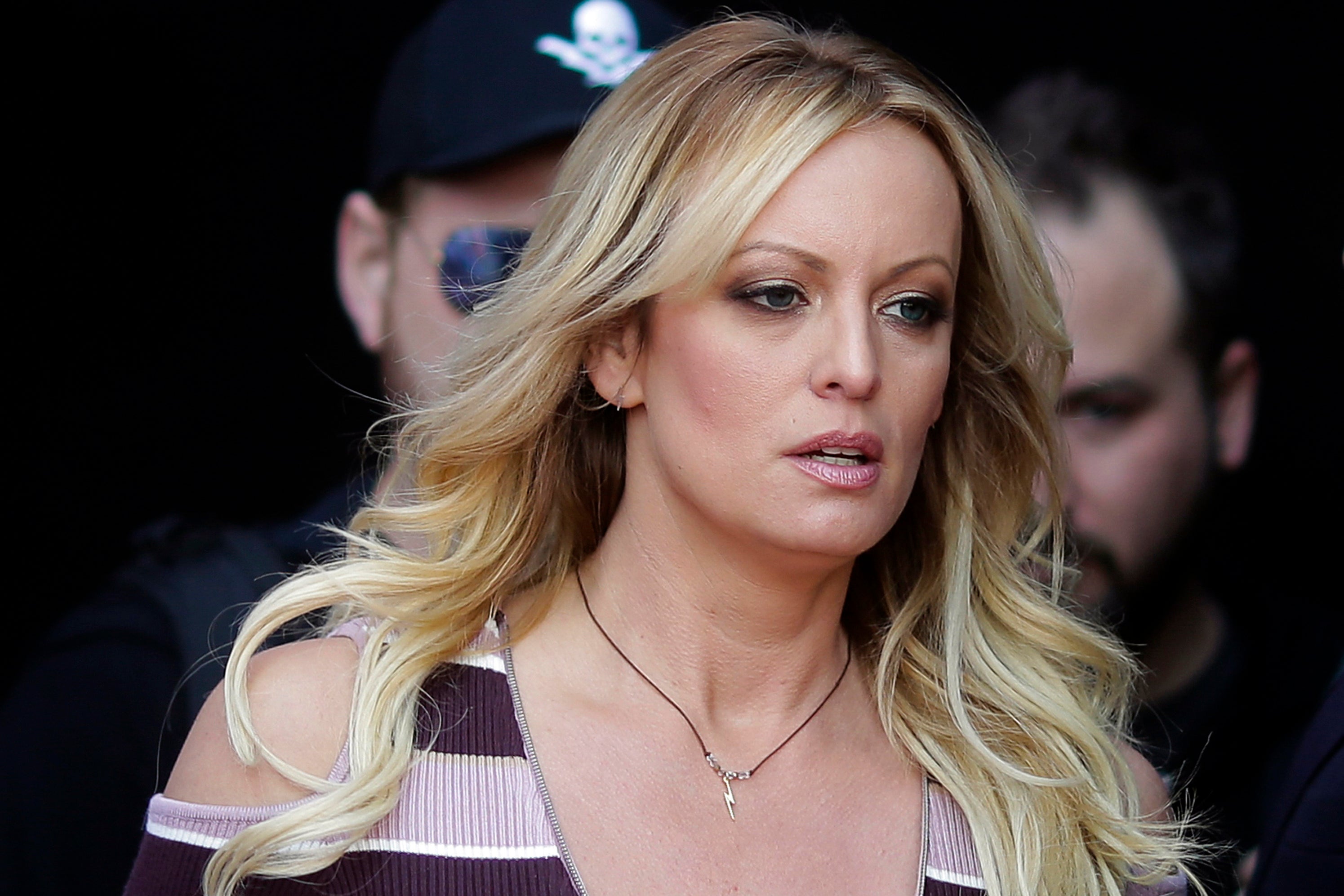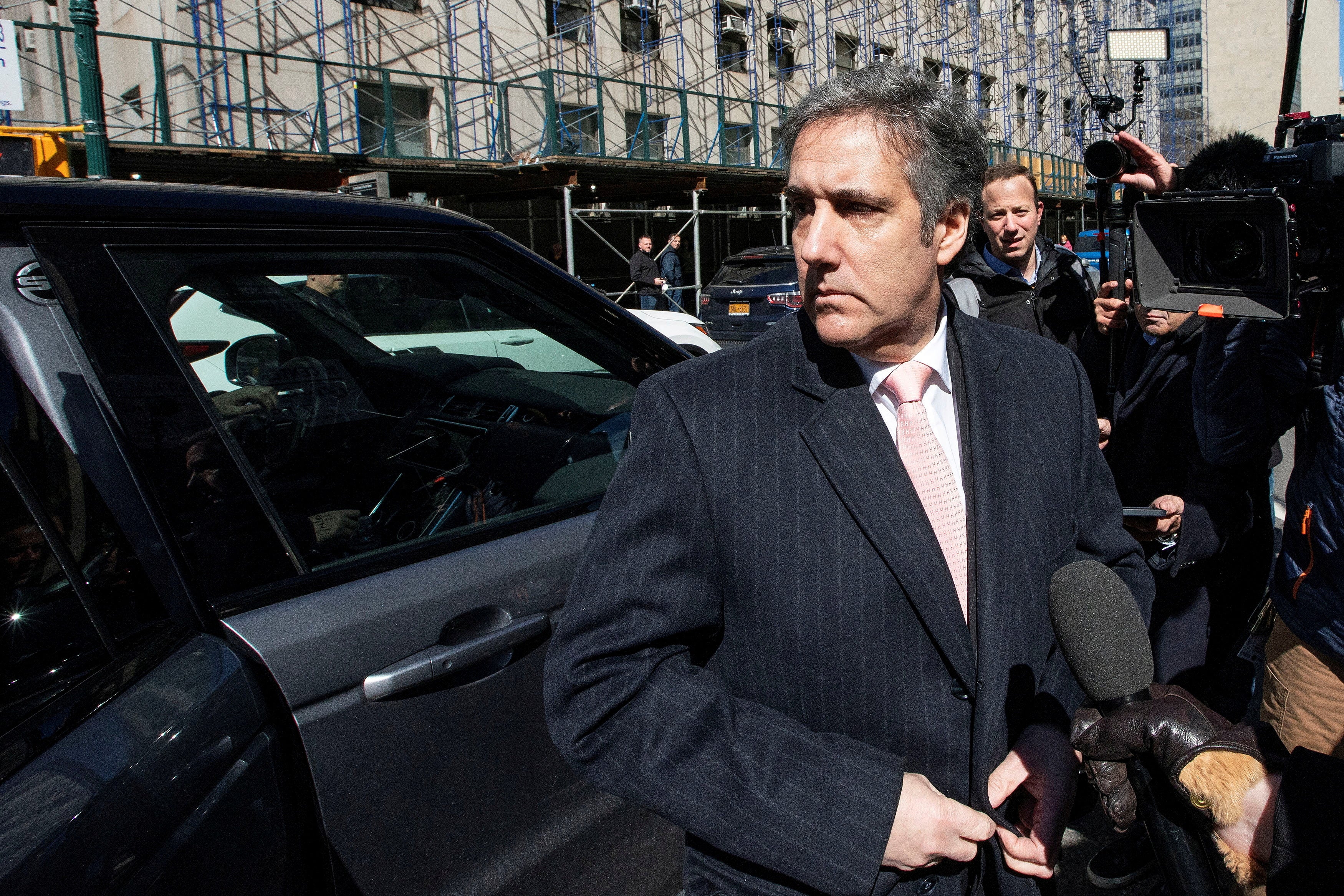
Donald Trump has been indicted by a New York City grand jury on charges of falsifying business records stemming from payments he made to adult film star Stormy Daniels to prevent her from revealing an affair he had with her before the 2016 election.
A source told The Independent that grand jurors voted to indict the ex-president at some point this week, and that indictment is currently under seal.
It was only filed with the New York Supreme Court late on Thursday, just before the court clerk’s office wrapped its business for the day.
Mr Trump is reportedly facing more than 30 counts related to business fraud, sources told CNN after the indictment became public.
Filing the indictment, which has been signed by the grand jury foreperson, with the clerk of court is what makes a criminal case official, but because it is currently under seal, it will remain so until it is unveiled at some point in the near future by district attorney Alvin Bragg.
The twice-impeached former president had signaled that he could face arrest by Mr Bragg’s office, which was still in the process of presenting evidence to a grand jury as recently as Monday. He previously said in a post on his Truth Social platform that he had expected to be arrested on 21 March, but that date came and went without an indictment being handed down from the grand jury.
Mr Bragg said in a statement on Thursday 30 March that his office has been in touch with Mr Trump’s attorneys over the former president’s surrender.
“This evening we contacted Mr Trump’s attorney to coordinate his surrender to the Manhattan DA’s Office for arraignment on a Supreme Court indictment, which remains under seal. Guidance will be provided when the arraignment date is selected,” Mr Bragg said.
Mr Trump’s lawyers have indicated that he will surrender to New York authorities early next week.
In the time between when he falsely claimed he would be arrested and the announcement that the grand jury had, in fact, indicated him, the ex-president has ramped-up increasingly unhinged rhetorical attacks on Mr Bragg, including at a 25 March rally in Waco, Texas.
During an airplane flight to the Texas rally, he told a group of reporters traveling with him that he believed Mr Bragg had “dropped the case” against him and called the entire matter “a fake case”.
But at the event later that evening, Mr Trump described the Manhattan prosecutor’s effort to hold him to account for alleged crimes as interference in next year’s presidential election.
“Prosecutorial misconduct is their new tool, and they’re willing to use it at levels never seen before in our country. We’ve had it, but we’ve never had it like this,” he said. “We must stop them and we must not allow them to go through another election where they have yet another tool in their tool kit”.
Mr Trump has also spent much of the last few weeks posting rambling rants against Mr Bragg to Truth Social in which he accused Manhattan’s top prosecutor, who is Black, of being a racist, and of “using the power of his office to persecute, indict and persecute a former president of the United States of America” while letting “murderers, rapists and drug dealers walk free”.
One such post to his website even included a photo of the ex-president holding a baseball bat positioned next to a photo of Mr Bragg’s head in a manner that made it look as if Mr Trump was preparing to strike the Manhattan prosecutor. He later deleted the post, which one of his attorneys called “ill-advised” and blamed it on the ex-president’s staff during an appearance on NBC’s Meet the Press.
The violent and incendiary rhetoric against Mr Bragg may have had an effect already. Last week, the New York prosecutor recieved a death threat in the mail along with a white, powdery substance that was later determined to be harmless.
Charges against Mr Trump come despite House GOP attempt to interfere
Mr Bragg’s decision to follow through with bringing charges against the ex-president also comes after an unprecedented effort by Mr Trump’s House Republican allies to force Mr Bragg to give evidence about his ongoing investigation to a trio of House committees.
Last week, the chairs of House judiciary, oversight and administration committees – representatives Jim Jordan, James Comer and Bryan Stiel – sent Mr Bragg a letter demanding he appear for a transcribed interview and turn over documents about his investigation, which they, like Mr Trump, described as an effort to interfere in the 2024 presidential election.
After Mr Bragg’s general counsel responded by noting that the congressional request “treads into territory very clearly reserved to the state” by asking for information on a local prosecutor’s effort to enforce state law and said Mr Bragg “is obliged by the federal and state constitutions to protect the independence of state law enforcement functions from federal interference,” the trio of committee chairs replied in a Saturday letter stating that their inquiry is legitimate because “the potential criminal indictment of a former president of the United States by an elected local prosecutor of the opposing political party (and who will face the prospect of re-election) implicates substantial federal interests”.
They added that Mr Bragg’s work falls under the jurisdiction of Mr Jordan’s House Judiciary Committee because that panel — and Congress — has “a specific and manifestly important interest in preventing politically motivated prosecutions of current and former Presidents by elected state and local prosecutors, particularly those tried before elected state and local trial-level judges”.
“Therefore, the Committee on the Judiciary, as a part of its broad authority to develop criminal justice legislation, must now consider whether to draft legislation that would, if enacted, insulate current and former presidents from such improper state and local prosecutions,” they said.
“Because your impending indictment of a former president is an issue of first impression, the committees require information from your office to inform our oversight.”
The indictment against Mr Trump makes him the first former US president to face criminal charges in the country’s nearly 250-year history. Federal authorities once considered seeking an indictment against former president Richard Nixon for crimes he committed while in office, but the pardon issued to him by his successor, Gerald Ford, made charging him impossible.
Unlike the charges that were never filed against Nixon, who died in 1994, the charges against Mr Trump have been filed in state court and cannot be short-circuited by a future presidential pardon.
But Mr Bragg’s status as a state prosecutor outside the federal court system hasn’t stopped Mr Trump’s allies in the House GOP conference from attempting to use what power they have to defend him.
In a letter sent to Mr Bragg on Monday, House judiciary committee chairman Jim Jordan, House oversight committee chairman James Comer, and House administration committee chair Bryan Steil accused the Democratic prosecutor of being “about to engage in an unprecedented abuse of prosecutorial authority” by indicting Mr Trump.
“In light of the serious consequences of your actions, we expect that you will testify about what plainly appears to be a politically motivated prosecutorial decision,” they said.
In a statement, Mr Bragg said his office “evaluate[s] cases in our jurisdiction based on the facts, the law, and the evidence”.
“It is not appropriate for Congress to interfere with pending local investigations. This unprecedented inquiry by federal elected officials into an ongoing matter serves only to hinder, disrupt and undermine the legitimate work of our dedicated prosecutors. As always, we will continue to follow the facts and be guided by the rule of law in everything we do,” he said.
How did Donald Trump end up in the dock?
The indictment against the twice-impeached ex-president is the latest chapter in a saga that stretches back to 2016, when Mr Trump’s then-personal attorney, Michael Cohen, arranged for hush-money payments to two women with whom he had extramarital affairs: Ms Daniels, whose legal name is Stephanie Gregory Clifford; and ex-Playboy model Karen McDougal.

The $130,000 sum paid to Ms Daniels was funneled through a shell company created for that purpose by Cohen, who was later reimbursed by Mr Trump’s company.
Earlier in 2016, Cohen also arranged for Ms McDougal to be paid $150,000 by the publisher of the supermarket tabloid the National Enquirer, which squashed her story in a journalistically dubious practice known as “catch-and-kill”.
Mr Trump has repeatedly denied having an affair with Ms Daniels, but in her 2018 memoir, Full Disclosure, the adult film actress described her 2006 encounters with the future president – and his anatomy – in detail, writing that Mr Trump’s penis was “smaller than average” but “not freakishly small”.
“He knows he has an unusual penis – it has a huge mushroom head. Like a toadstool,” she wrote. “It may have been the least impressive sex I’d ever had, but clearly, he didn’t share that opinion.”
The timing of Mr Trump’s hush-money payments – a decade after the affair – will figure prominently in any trial on the charges he faces. Mr Bragg’s office will need to show that the payments were related to the 2016 election and not made for other purposes.
Those payments, which were reimbursed to Cohen from Mr Trump’s eponymous company, the Trump Organization, saw the real estate and licensing corporation “gross up” Cohen’s reimbursement for the Ms Daniels payment for “tax purposes,” according to federal prosecutors who filed criminal charges against the lawyer in connection with the payments in 2018.
Cohen pleaded guilty to violating federal campaign finance law in connection with the payments. Federal prosecutors say the payments amounted to illegal, unreported assistance to the ex-president’s 2016 campaign. But they declined to file charges against Mr Trump himself, citing a longstanding prohibition against indicting sitting presidents.
The disgraced former lawyer, who was disbarred following his federal guilty plea, has been a key witness against Mr Trump. He met with prosecutors as recently as 13 March, just days before the grand jury voted to indict his former boss.
The charges against Mr Trump, who prosecutors allege to have falsified business records by logging Cohen’s reimbursement for the Daniels payment as legal fees, are only misdemeanor charges under New York law. But a separate provision of Empire State law allows prosecutors to upgrade that charge to a felony because Mr Trump allegedly falsified the records to cover up another crime.

The decision by grand jurors to indict Mr Trump came following a surprise twist in the years-long probe into the ex-president by the office led by Mr Bragg.
After years of ignoring the hush-money case, prosecutors began interviewing witnesses about it earlier this year. Among those former Trump associates interviewed before the grand jury were Hope Hicks, Mr Trump’s ex-White House communications director, and his 2016 campaign manager and former White House counselor, Kellyanne Conway.
“It may have been the least impressive sex I’d ever had”— Stormy Daniels on her alleged affair with Donald Trump
Prosecutors also repeatedly spoke to Cohen, Mr Trump’s ex-fixer who is the only person to face charges as a result of the hush-money scheme – until today, and who once vowed to "take a bullet" for his former boss.
He later told the House oversight committee that “everything” related to the charges that sent him to prison “was done with the knowledge and at the direction of Mr Trump”.
Because Cohen’s prior criminal charges included having lied to Congress, Mr Bragg’s office interviewed Cohen upwards of 20 times to be sure of his testimony before bringing him before the grand jury for two sessions, one on Monday and one on Wednesday. He has also said that he has provided prosecutors with documentary evidence to back up his testimony.
So far, Mr Trump’s camp has taken the same posture they have taken with regard to any attempt to hold him accountable for anything – by casting it as an illegitimate and politically-motivated attempt to hurt his electoral prospects, rather than an attempt to enforce criminal laws against a person who allegedly violated them.
In a rambling statement released last Thursday, Trump campaign spokesperson Steven Cheung said the now-indicted, twice-impeached former president “is completely innocent” and “did nothing wrong”.
“Democrats have investigated and attacked President Trump since before he was elected – and they’ve failed every time. Now Democrats are at it again, pushing the ‘Nuclear Button’ and attacking a president because of a disgraced extortionist. This is happening because President Trump is leading in the polls by a large margin against both Democrats and Republicans, and there’s never been anything so blatant in American political history,” he said.
What other criminal peril could Donald Trump face?
The New York grand jury’s indictment against Mr Trump could be just the first set of criminal charges facing the ex-president as he attempts to become the first former president to return to the White House for a nonconsecutive term since Grover Cleveland accomplished that feat in 1892.
Authorities in multiple jurisdictions are overseeing four other investigations that could result in more indictments against the twice-impeached, once-indicted former chief executive.
In Fulton County, Georgia, district attorney Fani Willis is weighing whether to ask a grand jury to indict Mr Trump on charges relating to his efforts to pressure Peach State officials into overturning his 2020 election loss to Joe Biden in the state.
In 2022, a special grand jury Ms Willis requested concluded a monthslong probe into Mr Trump’s efforts to reverse his 2020 election defeat to Mr Biden, including his calls to Peach State election officials and a plot to submit forged electoral college documents to the National Archives to give then-vice president Mike Pence a reason to hijack the 6 January 2021 joint session of Congress by declaring him and Mr Trump the winners of the election.
In a report filed with the Fulton County District Court, the 23-member grand jury’s report said “a majority of the grand jury believes that perjury may have been committed by one or more witnesses testifying before it” and recommended that Ms Willis “seek appropriate indictments for such crimes where the evidence is compelling”.
Mr Trump’s legal team has asked the court to toss out the grand jury’s work in its entirety, citing public statements by grand jurors and other grounds which they say necessitates Ms Willis’s disqualification from ever prosecuting the ex-president. But it’s unclear whether the ex-president’s strategy will bear fruit.
The former president’s efforts in the run-up to the 6 January attack on the Capitol are also under investigation by a federal grand jury working with Jack Smith, a special counsel named to supervise probes into Mr Trump by attorney general Merrick Garland in November.
Mr Smith, a former federal prosecutor who most recently worked overseas for a war crimes tribunal in The Hague, has sought to interview numerous ex-Trump White House officials who were privy to the ex-president’s thinking and actions in the weeks between his 2020 election loss to Mr Biden and the worst attack on the Capitol since Major General Robert Ross ordered British troops to burn it during the War of 1812.
He is also investigating whether Mr Trump violated US laws prohibiting unauthorised retention of national defence information and obstruction of justice, with that investigating stemming from Mr Trump’s alleged possession of hundreds of documents bearing classification markings long after his term in the White House — and his authorisation to possess such documents — came to an end.
Mr Smith recently obtained a court order allowing him and members of a separate Washington, DC grand jury to question one of Mr Trump’s lawyers, Evan Corcoran, about conversations with the ex-president in the time period between when he recieved a grand jury subpoena compelling him to return any classified documents in his possession and Mr Corcoran’s drafting of a false affidavit in which another one of Mr Trump’s then-lawyers, Christina Bobb, claimed that all such documents had been returned.
Yet another investigation by federal officials isn’t targeting Mr Trump personally but could potentially imperil him in the future.
According to The Guardian, the ex-president’s Trump Media and Technology Group – the company that operates his Truth Social website – is the subject of a Securities and Exchange Commission and Department of Justice probe into whether the company violated federal money laundering laws.
The investigation is reportedly focused on $8 million the company recieved in 2021 and 2022 from “two obscure entities that both appear to be controlled in part by the relation of an ally of Russian president Vladimir Putin”.







